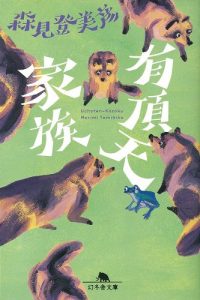 (uchoten kazoku – Morimi Tomihiko)
(uchoten kazoku – Morimi Tomihiko)
Most of the characters in this book are tanukis, of which the standard English translation seems to be “Japanese racoon dogs.” Tanukis can shape shift into quite a range of things, people, or even places in this book. The story is about the interaction between humans, tanukis, and tengus, who can fly and create massive winds. The story is told by Yasaburo, the 3rd son in a family of tanukis made up of a mother and 4 sons who are struggling to fill the shoes of their late father, who was the leader of the Tanuki world.
The rules for this fantastic world are a bit crazy and hard to understand, but it is grounded in the actual geography of Kyoto. It contains lots of detailed and excellent descriptions of real places, and almost acts like a travel book. You’ll find yourself wanting to walk around Kyoto and see the book’s setting in person.
The details are fleshed out using rich language, heavy with creative ways of using words, and full of 四字熟語, which are four character sayings. You have to be careful though, since words are not always used in the most common way, and because sometimes four character sayings are even misused intentionally to show the personality of a couple of the characters.
Here is an example of an interesting use of language that takes a common phrase and expands on it.
次兄はいささか腹を立てた。しかし、横のものを縦にもしない次兄にすれば、ごらんと横になった腹をわざわざ立てるのすら面倒だったらしく、だんだん平気で聞き流すようになった。
This phrase is about how the Yajiro, the second oldest brother in the family, got a bit angry. It takes the common way of saying to get angry, which is literally “stomach stands up”. It extends the literal meaning and says Yajiro would never make anything laying down stand up, so even going out of his way to stand up his sideways stomach was a pain, so he gradually just calmly let it slide. This is just one example of the way Morimi creatively plays with words in his writing.
On another note, I was surprised that the reason the Tanukis like Christmas is because they perceive it as meaningless, and they enjoy the lights and Kentucky Fried Chicken. In America, even people who are not in awe that God came to earth as a baby to carry out his plan of redemption usually know that Christmas is a celebration of Jesus’s birthday, which is a very influential event in Western history, whether you believe it happened or not.
This emphasized for me how unfamiliar and foreign the Gospel still is in Japan. However, a few chapters later I was surprised to see a reference to splitting the Red Sea, which comes from the book of Exodus in the Bible, where God parted the waters so his people could flee from the Egyptian army who was chasing them. I always find it interesting to see how the Bible is referenced in Japanese novels.
There were a lot of things that I liked about this book. The way Morimi uses words is extremely interesting. I feel like I learn a lot of vocabulary, and it is always engaging. I’m sure I am missing some references and humor. I really wouldn’t recommend this book to beginners, but I did find it a bit easier to read than things I have read from the early 1900s because it uses modern Japanese, and it uses less heavy dialect than I expected being based in Kyoto.
On top of the rich language and fascinating descriptions of the setting, this book boasts a very good story as well. I’m looking forward to the bunko release of the sequel.
